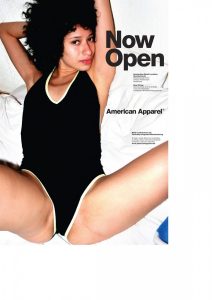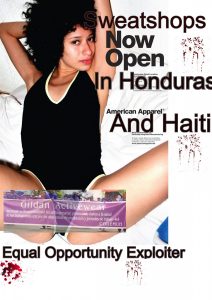
American Apparel Advertisement
The original advertisement is extremely problematic as it is exploitive and sexualizes the model, which is an approach to advertising American Apparel is infamous for. In the case of this particular advertisement, the words “Now Open” ostensibly refer to the opening of a retail location in Amsterdam, and the fact that the company is hiring for that location. However, the model’s incredibly provocative position with her legs spread apart in combination with the “Now Open” text clearly sexualizes the model in two connotative ways. The first is the general connotation of the model being open to a sexual encounter. The second connotation is more explicit, as the positioning of her body, including her open legs, strongly suggests that she is open for vaginal penetration. Clearly, the exploitation depicted in this advertisement speaks to the continuing need for feminism to combat the overt sexual exploitation of women in the media. Unfortunately, there is another layer to this advertisement, as the former CEO and founder of American Apparel, Dov Charney, was removed by the board due to a number of sexual harassment charges as well as three accusations of rape, which speaks to a sexist organizational culture, and is another example of why the MeToo movement is so important.
One of the positive traits of American Apparel was that all of its products were made in Los Angles, which is mentioned in this advertisement. Therefore, despite the company and Charney’s exploitation of women, at least this garment manufacturer does not exploit foreign workers in garment sweatshops abroad. However, this is no longer the case, as Charney’s issues resulted in American Apparel being sold to the Quebec-based company Gildan in 2017. While Gildan is in the process of rebranding American Apparel away from its former smutty image, the company has quietly taken its exploitation to sweatshops abroad, particularly in Haiti and Honduras where the majority of garment workers are women. Therefore, while the rebranding can been seen as a success for universal feminism, Gildan’s presence in Honduras and Haiti reveals just how myopic universal feminism can be, and why independent domestic feminisms are needed globally, but at the same time, need the solidarity and support of universal feminism.
 My culture jam accomplishes a few important tasks. The first task that is accomplished is that it reveals that American Apparel is now utilizing sweatshops in Haiti and Honduras to make its clothing. This has been accomplished by adding the word “sweatshops” above and the words “in Honduras and Haiti” below the preexisting text of “now open.” The blood splatter has been added to highlight the danger that sweatshop workers face and to highlight that in both Haiti and Honduras the government and its paramilitaries have been engaged in a violent campaign against union leaders and organizers. At the bottom of the advertisement, I added the words “equal opportunity exploiter.” These words highlight the fact that while American Apparel is known for sexualizing and exploiting women in its advertisements, the company also exploits both male and female workers in sweatshops in poor countries. The banner that goes from hamstring to hamstring of the model has a literal and connotative meaning. The literal meaning is found in the text of the banner, which was carried at a workers’ rights protest by Gildan workers in Honduras. The banner reads Gildan Activewear is not complying with its corporate social responsibility by causing damages to worker health due to high production quotas. It is clear that Gildan sweatshop workers are unhappy with their working conditions. The connotative meaning is related to the placement of the banner as well as its translucency. It can almost be seen as the passing of the banner of exploitation; whereas the company is moving away from exploitative advertising, it is embracing exploitative labour practices. The translucency of the banner represents this transition, as American Apparel still has a reputation for its sexualized advertisements, while many people are unaware that the company has taken its production out of America. In my opinion, American Apparel reflects the problems with universal feminism, in that it tackles issues such as sexualized advertising, but does not draw attention to the labour rights violations experienced by women in poor countries. Again, this supports the needs for the acceptance of many localized feminisms with universal feminism providing much better support.
My culture jam accomplishes a few important tasks. The first task that is accomplished is that it reveals that American Apparel is now utilizing sweatshops in Haiti and Honduras to make its clothing. This has been accomplished by adding the word “sweatshops” above and the words “in Honduras and Haiti” below the preexisting text of “now open.” The blood splatter has been added to highlight the danger that sweatshop workers face and to highlight that in both Haiti and Honduras the government and its paramilitaries have been engaged in a violent campaign against union leaders and organizers. At the bottom of the advertisement, I added the words “equal opportunity exploiter.” These words highlight the fact that while American Apparel is known for sexualizing and exploiting women in its advertisements, the company also exploits both male and female workers in sweatshops in poor countries. The banner that goes from hamstring to hamstring of the model has a literal and connotative meaning. The literal meaning is found in the text of the banner, which was carried at a workers’ rights protest by Gildan workers in Honduras. The banner reads Gildan Activewear is not complying with its corporate social responsibility by causing damages to worker health due to high production quotas. It is clear that Gildan sweatshop workers are unhappy with their working conditions. The connotative meaning is related to the placement of the banner as well as its translucency. It can almost be seen as the passing of the banner of exploitation; whereas the company is moving away from exploitative advertising, it is embracing exploitative labour practices. The translucency of the banner represents this transition, as American Apparel still has a reputation for its sexualized advertisements, while many people are unaware that the company has taken its production out of America. In my opinion, American Apparel reflects the problems with universal feminism, in that it tackles issues such as sexualized advertising, but does not draw attention to the labour rights violations experienced by women in poor countries. Again, this supports the needs for the acceptance of many localized feminisms with universal feminism providing much better support.